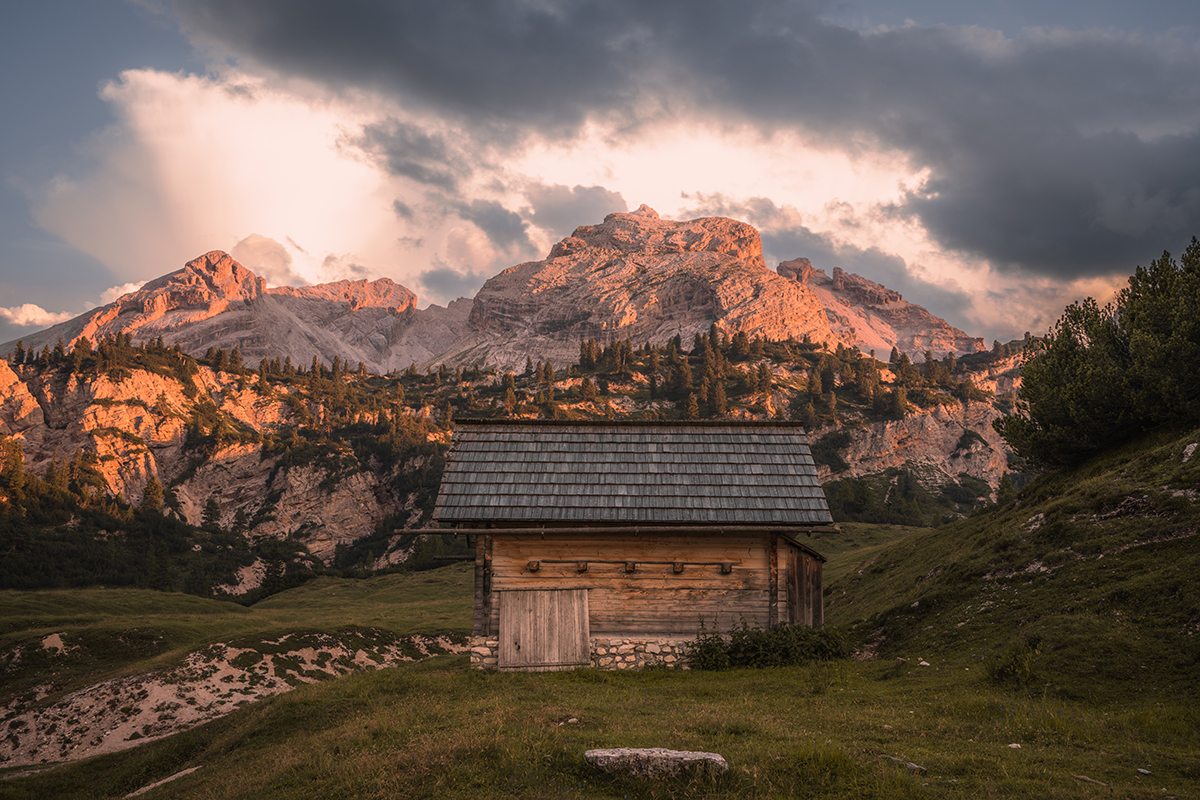Communing With Nature
Tahir Iqbal explores the English countryside and mountains of Europe with his Tamron 17-28mm F2.8 wide-angle and 28-200mm all-in-one zoom lenses.
Share the article:
More Photo Tips | Video Gallery | Photo Gallery | Enewsletter sign-up
By Jenn Gidman
Images by Tahir Iqbal
If you were to ask Tahir Iqbal where he’d most like to be dropped so he could spend the day taking photos, there’s not much hesitation. “The mountains,” answers the UK photographer from Cambridge. “I’m an IT engineer by profession—nowhere close to being outside and exploring landscapes and nature. But maybe that’s why I enjoy outdoor photography so much. It’s a much-needed break from my day job. Here in Cambridge and the surrounding areas, there are plenty of forests around for me to wander in. When I want to venture out a little further and get my mountain fix, I head to the Dolomites or the Alps.”
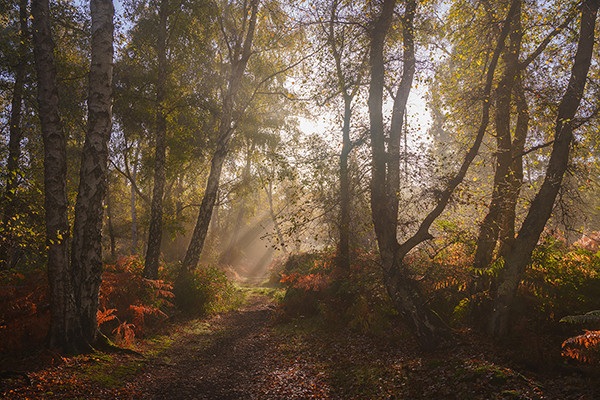
28-200mm (35mm), F10, 1/20 sec., ISO 100
Click image to view larger
Whether he’s trekking through the woods or attempting a summit, Tahir has his Tamron 17-28mm F/2.8 Di III RXD wide-angle zoom and 28-200mm F/2.8-5.6 Di III RXD all-in-one zoom for his Sony mirrorless camera system. “Because I’m often out all day on rather long walks, I need gear that’s very light,” he says. “These two lenses, combined with my Sony camera, offer that light weight. Having a wide-angle lens as well as a zoom with more reach gives me all the flexibility I need during my excursions. I’ve been so pleasantly surprised with the image quality of both lenses. I’ve compared images taken with the 17-28 to those taken with a more expensive lens within that focal length range, and I honestly couldn’t see much of a difference.”
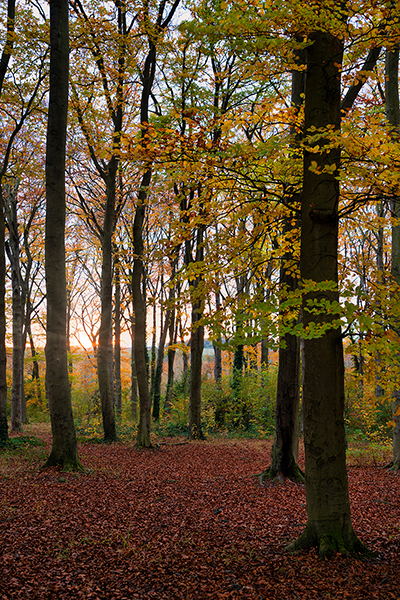
17-28mm (18mm), F8, 1/5 sec., ISO 200
Click image to view larger
Tahir also prefers to use a lower aperture when shooting at wider angles with the 28-200mm, to keep his main subject (typically closer to the camera) sharp, against a nicely blurred-out background. “It’s how the human eye sees things,” he says. “The F2.8 maximum aperture on that lens is fantastic in that regard and performs beyond my expectations. It lends all of my photos a very natural look.”
Tahir’s goal is to keep his images as simple as possible, and, when he’s editing, as close to what he originally saw in front of his camera. “I try to remember the colors, the vibrance, how the scene presented itself,” he says. “I know some people like to manipulate their photos a little more, maybe add certain elements in during post-processing, but I want everything to be how I remember it.”
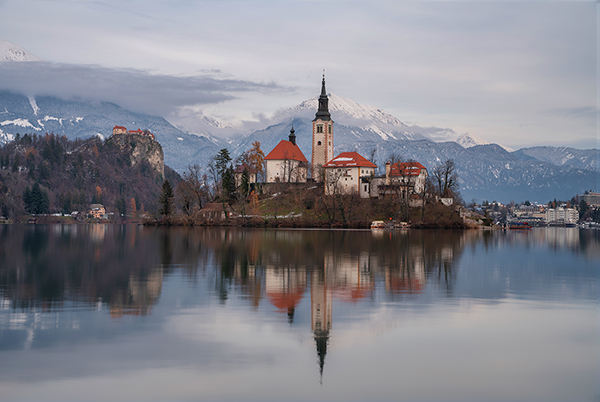
28-200mm (64mm), F13, 1/20 sec., ISO 100
Click image to view larger
TAHIR’S QUICK TIPS
Compose with a destination’s mood in mind.
On the Madeira archipelago, a Portuguese region in the North Atlantic off the northwest coast of Africa, lies the Fanal Forest, an ancient laurel woodland that’s been deemed a UNESCO World Heritage Site. Some of the trees there are said to be 500 years old. The area is also known for its fog, and so I knew when I went there that I wanted to compose the image to capitalize on that mood of mystery. Where I was standing was flat, but the trees further back were tilted, and I thought it made for a sort of off-kilter photo, especially peeking out from under those branches.
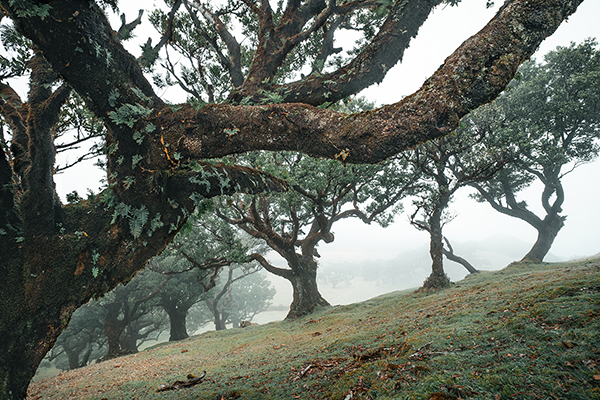
17-28mm (17mm), F8, 1/50 sec., ISO 250
Click image to view larger
Don’t write off the light.
If you wait for the “perfect” day, you might never head out to take pictures. When I was shooting in the Dolomites in northeastern Italy last summer, I was doing a lot of long-distance hiking, and I was resting at the end of the day after one particularly long trek, in front of a cabin near where I was spending the night. In most pictures you’ll see of this range, you won’t see a lot of green or warmth; they’re pretty rough-looking mountains. And at first that’s what I was seeing, too, because the sky was dark, without much light peeking through. Then, all of a sudden, the clouds broke, and everything changed. The combination of the golden light on the mountains, against that stormy sky, and with that rustic cabin in the foreground, made the image.
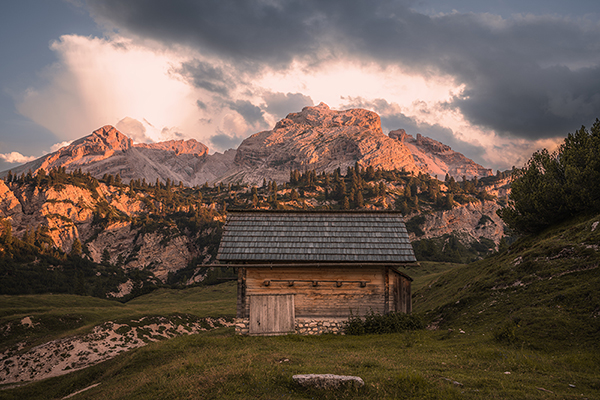
28-200mm (37mm), F11, 1.3 sec., ISO 100
Click image to view larger
Stick around a little longer than planned—the unexpected might emerge.
In Dorset lies Durdle Door, a limestone arch that stretches along the Jurassic Coast, along with Man O’ War Beach. This is a very famous location, where you can walk for days. It was sunset when I visited, with a dark, dramatic sky. I was on one side of the arch and had taken some photos, but when I went to the other side, this ship suddenly appeared out of nowhere and settled in the middle of the cove. Between that and the light hitting the clouds so nicely, I knew I had my shot.
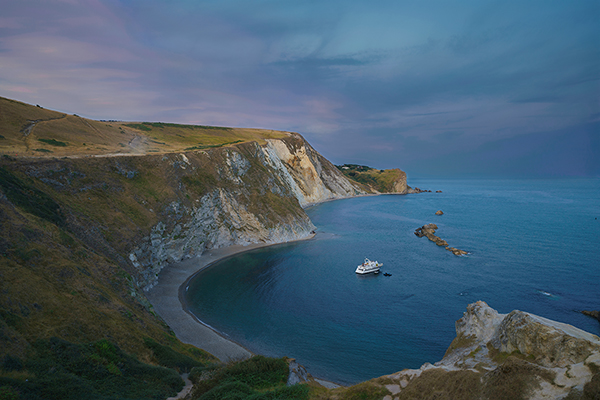
17-28mm (28mm), F11, 1/5 sec., ISO 200
Click image to view larger
To see more of Tahir Iqbal’s work, check out his website and Instagram.
More Photo Tips | Watch Videos | Learn More About Tamron Lenses | Photo Gallery
